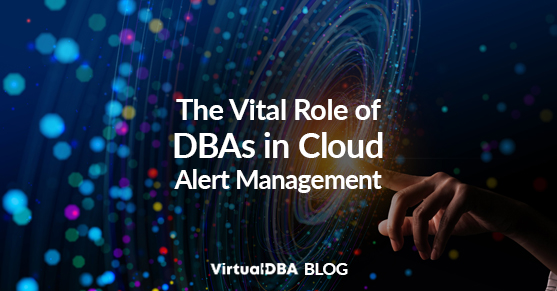In the era of cloud computing, where data is the new currency, databases are the backbone of modern businesses. They store, manage, and retrieve critical information for decision-making and operations. However, ensuring cloud databases’ seamless functioning requires constant vigilance and proactive measures. This is where Database Administrators (DBAs) come in, serving as the guardians of data integrity and availability. In particular, their role in receiving and addressing alerts for cloud-hosted databases is indispensable.
Let’s delve deeper into why DBAs are crucial for effective alert management of any database system, especially when a database is in the cloud, where some may mistakenly assume the cloud will take care of these things.
1. Expertise in Database Management
DBAs possess specialized knowledge and skills in database management. They understand the intricacies of database systems, including configuration, optimization, and troubleshooting. When it comes to cloud databases, such as Amazon RDS, Azure SQL Database, or Google Cloud SQL, DBAs are adept at navigating the nuances specific to each platform. This expertise enables them to interpret alerts accurately and take appropriate actions swiftly.
2. Immediate Response to Critical Alerts
In a cloud environment, databases are susceptible to various issues, such as performance degradation, resource exhaustion, or security breaches. Timely detection and response to these issues are imperative to prevent disruptions and data loss. DBAs monitor alert notifications around the clock, ensuring that critical alerts are promptly addressed. Whether scaling resources, tuning queries, or implementing security patches, DBAs have the expertise to mitigate risks and maintain database health.
3. Proactive Performance Management
Beyond reactive responses to alerts, DBAs proactively manage database performance to preempt potential issues. By analyzing trends, identifying bottlenecks, and fine-tuning configurations, they optimize database performance for optimal efficiency and reliability to help reduce overall cloud costs. This proactive approach minimizes the occurrence of alerts and enhances the overall user experience. DBAs continuously monitor key performance metrics, such as CPU utilization, memory usage, and disk I/O, to ensure optimal database operation.
4. Security and Compliance Enforcement
Data security is paramount in the cloud, where sensitive information is stored and processed. DBAs are pivotal in implementing robust security measures and enforcing compliance standards. They monitor access controls, encryption mechanisms, and audit logs to safeguard data against unauthorized access and breaches. Additionally, DBAs ensure compliance with regulatory requirements, such as GDPR, HIPAA, or PCI DSS, by configuring database settings and implementing security best practices.
5. Collaboration with DevOps Teams
Collaboration between DBAs and DevOps teams in modern IT environments is essential for achieving agility and scalability. DBAs work closely with DevOps engineers to automate alert responses, streamline deployment processes, and optimize infrastructure resources. Organizations can accelerate innovation and enhance operational efficiency by integrating database management tasks into DevOps workflows. DBAs provide valuable insights and guidance to DevOps teams, enabling them to leverage cloud technologies effectively.
6. Continuous Learning and Adaptation
The landscape of cloud computing is constantly evolving, with new technologies and trends emerging regularly. DBAs embrace lifelong learning and stay abreast of the latest database and cloud platform developments. They undergo training, attend conferences, and participate in communities to expand their knowledge and skills. This commitment to continuous learning enables DBAs to adapt to changing requirements and leverage cutting-edge solutions for database management.
7. Risk Mitigation and Disaster Recovery
Despite robust preventive measures, database incidents and failures can still occur in the cloud. DBAs play a critical role in mitigating risks and implementing disaster recovery strategies to minimize the impact of such events. They design backup and replication solutions, establish failover mechanisms, and conduct regular drills to test recovery procedures. By maintaining comprehensive disaster recovery plans, DBAs ensure business continuity and data resilience in the face of unforeseen disasters.
Conclusion
The role of Database Administrators (DBAs) in receiving and addressing alerts for cloud-hosted databases is indispensable for ensuring the reliability, security, and performance of critical data systems. With their expertise in database management, proactive approach to performance optimization, and commitment to continuous learning, DBAs play a vital role in safeguarding data integrity and availability in the cloud. By collaborating with DevOps teams, enforcing security measures, and implementing disaster recovery strategies, DBAs enable organizations to harness the full potential of cloud technologies while mitigating risks effectively. In the ever-evolving landscape of cloud computing, DBAs serve as the linchpin of database operations, driving innovation and resilience in the digital age.
To learn more about our DBA Managed Services, please contact us.

